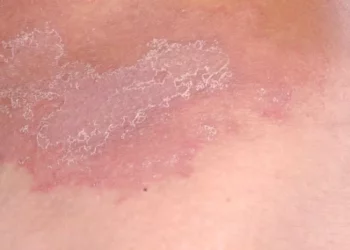Ringworm, despite its name, is not caused by a worm but is a fungal infection known as dermatophytosis. It affects the skin, hair, and nails, leading to itchy, red, circular rashes. The question of whether alcohol can be used to treat ringworm is a common one, as people often seek quick, accessible remedies for this uncomfortable condition. This article delves into the nature of ringworm, the properties of alcohol, and whether alcohol is an effective treatment option.
What is Ringworm?
Ringworm is a contagious fungal infection caused by dermatophytes, a type of fungi that thrives on keratin, the protein found in skin, hair, and nails. There are several species of fungi that can cause ringworm, including Trichophyton, Microsporum, and Epidermophyton.
Symptoms of Ringworm
Ringworm presents as a red, circular, and itchy rash with a clear or scaly center, giving it a ring-like appearance. It can affect various parts of the body, leading to different names based on its location, such as tinea corporis (body), tinea pedis (athlete’s foot), tinea cruris (jock itch), and tinea capitis (scalp).
Causes and Transmission
The infection spreads through direct contact with an infected person or animal, or by touching contaminated objects or surfaces. Warm, moist environments, such as locker rooms and public showers, are common breeding grounds for the fungus. Poor hygiene, excessive sweating, and weakened immune systems increase the risk of contracting ringworm.
SEE ALSO: What Are the Side Effects of Ringworm in Humans
Traditional Treatments for Ringworm
Ringworm is typically treated with antifungal medications, available both over-the-counter (OTC) and by prescription. Common treatments include:
- Topical Antifungals: Creams, ointments, and sprays containing active ingredients like clotrimazole, miconazole, and terbinafine are applied directly to the affected area.
- Oral Antifungals: For more severe or widespread infections, oral medications such as terbinafine, itraconazole, or fluconazole may be prescribed.
- Home Remedies: In addition to medical treatments, some people use home remedies like tea tree oil, coconut oil, and apple cider vinegar, which have antifungal properties.
The Properties of Alcohol
Alcohol, in the context of medical treatment, usually refers to isopropyl alcohol (rubbing alcohol) or ethyl alcohol (the type found in alcoholic beverages). Both types are known for their antiseptic properties, capable of killing bacteria and some fungi on contact.
Isopropyl Alcohol
Isopropyl alcohol is commonly used as a disinfectant and antiseptic. It evaporates quickly and is effective at killing a wide range of microorganisms, including bacteria and viruses. However, its efficacy against fungi, especially those causing ringworm, is not as well-documented.
Ethyl Alcohol
Ethyl alcohol, while also an effective antiseptic, is more commonly consumed in alcoholic beverages. When used topically, it shares many of the same properties as isopropyl alcohol but is less commonly used for disinfecting purposes due to its potential for causing skin irritation.
Can Alcohol Treat Ringworm?
Given alcohol’s antiseptic properties, it’s reasonable to consider its potential effectiveness against ringworm. However, the reality is more complex.
Effectiveness Against Fungi
While alcohol can kill some types of fungi, its effectiveness against dermatophytes (the fungi causing ringworm) is limited. Studies have shown that alcohol can inhibit the growth of fungi on surfaces and skin temporarily, but it does not provide a long-term solution or eradicate the infection.
Potential Risks
Using alcohol on ringworm-affected skin can cause several issues:
- Skin Irritation: Alcohol is a harsh substance that can dry out and irritate the skin, potentially worsening the symptoms of ringworm.
- Incomplete Treatment: Alcohol may reduce surface-level fungi but is unlikely to penetrate deeply enough to eliminate the infection entirely. This can lead to recurrence or persistence of the infection.
- Increased Discomfort: Applying alcohol to inflamed, itchy skin can be painful and exacerbate the discomfort associated with ringworm.
Proper Treatment Approaches
To effectively treat ringworm, it is essential to use proven antifungal treatments rather than relying on alcohol. Here are recommended steps:
- Consult a Healthcare Provider: For accurate diagnosis and appropriate treatment, seek advice from a healthcare professional, especially if the infection is widespread or persistent.
- Use Antifungal Medications: Apply OTC topical antifungals as directed or take prescribed oral medications for more severe cases.
- Maintain Hygiene: Keep the affected area clean and dry, change clothes and bed linens regularly, and avoid sharing personal items to prevent the spread of the infection.
- Avoid Irritants: Refrain from using harsh substances like alcohol on the affected skin to prevent further irritation.
Preventing Ringworm
Prevention is key to avoiding ringworm. Here are some tips to reduce the risk of infection:
- Good Hygiene Practices: Regularly wash hands, body, and hair with soap and water, especially after contact with potentially contaminated surfaces or animals.
- Keep Skin Dry: Fungi thrive in moist environments, so keep skin, especially in folds and creases, dry and well-ventilated.
- Avoid Sharing Personal Items: Do not share towels, clothing, hairbrushes, or other personal items with others.
- Clean Environments: Regularly clean and disinfect common areas, particularly in communal settings like gyms and locker rooms.
Conclusion
While alcohol has antiseptic properties that can kill some fungi, it is not a recommended treatment for ringworm. Its use can lead to skin irritation, incomplete treatment, and increased discomfort. Instead, effective treatment of ringworm involves using proven antifungal medications and maintaining good hygiene practices. If you suspect you have ringworm, consult a healthcare professional for the best course of action. Preventive measures, proper treatment, and avoiding irritants like alcohol will help manage and eliminate this common fungal infection.
Related Topics:

























